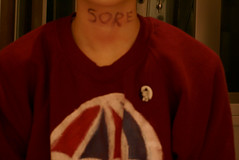 |
| Photo courtesy of Victoria Schofield (Flickr.com) |
A sore throat and cold are common
ailments that can be caused by a lot of factors, and many people would like to
know how to treat a sore throat and cold on their own. The term ‘cold’ is a
non-medical term; a cold is a condition that has the combined symptoms of
fever, malaise, nasal congestion and runny nose. Although the most common
causes of sore throats and colds are respiratory infections, it can also be
caused by non-infectious factors, like cigarette smoke. Other factors such as
weather changes and allergies to pollen can also trigger these conditions.
How To Treat A Sore Throat
And Cold On Your Own
Although it’s advisable to
seek first the opinion of a doctor, sore throats and colds can be treated at
home. Here are the things that can be done:
- Gargle with warm saline solution or oral antiseptic solutions if symptoms persist.
- Get ample sleep.
- Drink plenty of water.
- Sneeze out nasal secretions to clear the upper respiratory tract.
- In case of fever, take antipyretics such as Paracetamol every four hours as needed.
- Get fresh air.
- Stay away from irritants such as cigarette smoke. Don’t smoke while symptoms persist.
- Avoid known allergens such as pollen or dust.
If the sore throat and cold is
caused by infection, and if the above self-treatment is followed, it is
expected for the condition to subside. But if symptoms persist for more than
two weeks, you should consult a doctor and follow professional guidelines on how
to treat a sore throat and cold. Here are the things that you must bear in
mind:
- Always take antibiotic treatment on schedule. Don’t skip or miss doses.
- In case decongestants are prescribed, don’t stop the treatment abruptly to prevent rebound congestion.
- In case the patient has difficulty breathing, follow the proper guidelines in nebulization.
- If the patient develops symptoms of allergy from medication, stop taking them and consult the doctor.
- Ask the patient if swallowing is still difficult.
- Note for any signs of dyspnea (difficulty of breathing), such as grunting, labored breathing, and shortness of breath.
- Observe if the patient is still sneezing and coughing.
- Ask the patient if he is still experiencing a runny nose.
- Check the temperature.
However, if symptoms still
persists even with the doctor’s advice, the person experiencing the illness
must seek further consultation and emergency treatment. Here are some things
can indicate the need for further medical treatment:
- When the tonsils become more swollen
- When the patient is unable to talk or breathe
- When the patient verbalizes increased difficulty of breathing
- When fever is not subsiding
- When the patient becomes unconscious
- When the patient becomes cyanotic (bluish discoloration of the skin)
The key is to prevent the
worsening of symptoms and avoiding allergens and other respiratory tract
irritants. In addition, it would be very beneficial if we maintain a healthy
lifestyle and a balanced diet to increase our body’s resistance. How to treat a
sore throat and cold can be relatively easy.



No comments:
Post a Comment